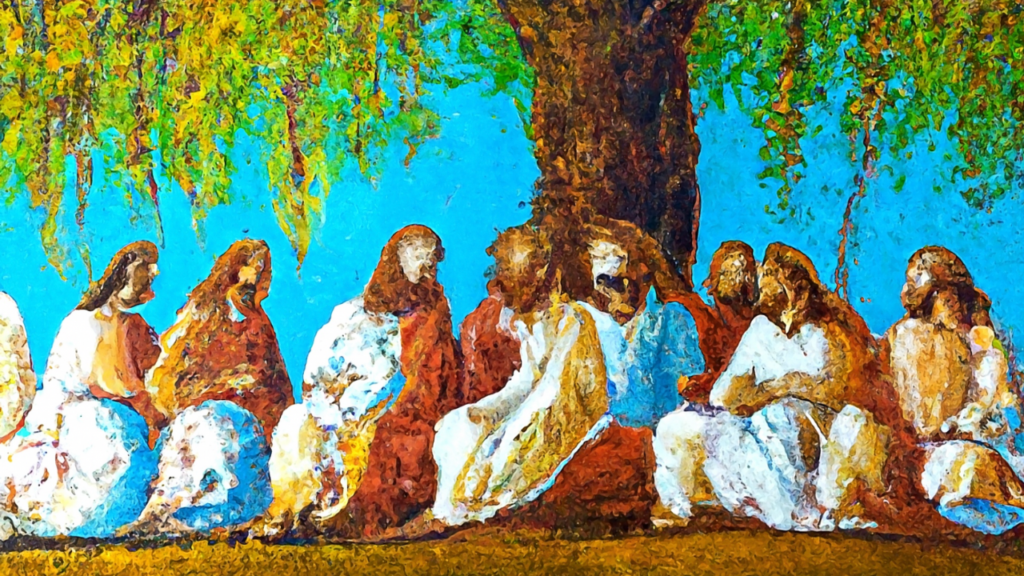Doubling groups is a worthy goal. Here is why. There is no discplemaking without small groups. It is the way Jesus did it. He gathered a group together and taught them. He taught them in the context of a group; in the context where they could discuss what was taught. This is how life-change happens. This is how Jesus did it and it is how we can do it.
Consider these words from Robert Coleman:
It all started by Jesus calling a few men to follow him. This revealed immediately the direction his evangelistic strategy would take. His concern was not with programs to reach the multitudes, but with men whom the multitudes would follow. Remarkable as it may seem, Jesus started to gather these men before he ever organized an evangelistic campaign or even preached a sermon in public. Men were to be his method of winning the world to God.
Having called his men, Jesus made a practice of being with them. This was the essence of his training program—just letting his disciples follow him.
When one stops to think of it, this was an incredibly simple way of doing it. Jesus had no formal school, no seminaries, no outlined course of study, no periodic membership classes in which he enrolled his followers. None of these highly organized procedures considered so necessary today entered into his ministry. Amazing as it may seem, all Jesus did to teach these men his way was to draw them close to himself. He was his own school and curriculum.
The natural informality of this teaching method of Jesus stood in striking contrast to the formal, almost scholastic procedures of the scribes. These religious teachers insisted on their disciples adhering strictly to certain rituals and formulas of knowledge which distinguished them from others; whereas Jesus asked only that his disciples follow him. Knowledge was not communicated by the Master in terms of laws and dogmas, but in the living personality of One who walked among them. His disciples were distinguished, not by outward conformity to certain rituals, but by being with him, and thereby participating in his doctrine. — Coleman, Robert E. 2006. The Master Plan of Evangelism.
God’s plan for forming spiritually mature disciples involves getting them in groups. People do not climb Mt. Everest alone. But every year, little groups, little bands of friends, scale its lofty heights.
People do not reach spiritual maturity alone. But in groups, with friends, in little platoons they can reach maturity and have fun while they do it. It will not be easy, but it can be fun.
Let me explain what I mean. Vietnam veteran William Broyles writes in his book, Brothers in Arms:
A part of me loved war.
A part of me loved war. Now, please understand, I’m a peaceful man, fond of children and animals. And I believe that war should have no place in the affairs of men. But,” he said, reflecting on his tour of duty in Vietnam, “the comradeship our platoon experienced in that war provides a moving and enduring memory in me. A comrade in war is someone you can trust with anything, because you regularly trust him with your life. In war, individual possessions and advantage count for nothing. The group, the unit, the platoon is everything.
Broyles goes on to describe how platoon members shared rice rations and passed around single cigarettes and shared the use of bamboo cots. He goes on to say, “In war, we regularly risked our lives to recover our wounded and dead. We often felt close enough to each other to call one another brothers.” Then, after describing the depth of feeling among the platoon members, he says it again: “A part of me loved war.” You get the feeling he’s not had a relational experience like that since.
Why is Broyles so passionate about his feelings, his positive feelings for Vietnam? I thought we all hated Vietnam.
I contend that it is because of the little platoon experience. And this little platoon experience is basic to Christian discipleship. People long for it; they need it. There is no maturity without it.
There is an epidemic of loneliness in America. (More on this later.) People long for love. They long for the love that only the church can give. God has commanded us to love them and the quickest way for us to reach America for Christ is by loving people through small group ministries. If we love them, they will come, and they will come to love our Lord.
We can reach America through small groups that double every two years or less. We can make disciples in small groups that grow and double every two years or less. We cannot do it with professionals alone. Granted, we need professionals to help. I am not against professionals; I am one. But we cannot depend on professionals alone to get the job done. The job is simply too big. We must turn the job over to the people of God. This is the way God designed it in the first place. So, let us get to the work.
Doubling your class is a worthy goal. Worthy of you giving your life to. We can change the face of Christianity in our generation. The bread and butter of our strategy is the person doing the work in the trenches: you, the small group leader.
Josh Hunt,
Author, Good Questions Have Groups Talking
Adapted from You Can Double Your Class in Two Years or Less





